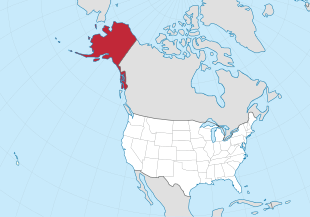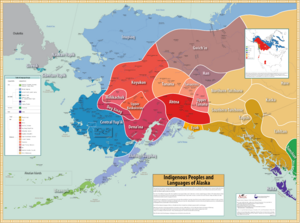More languages
More actions
| Alaska Alax̂sxax̂ (Aleut) Alaaskaq (Inupiaq) Alaskaq (Central Yupik) Anáaski (Tlingit) Alas'kaaq (Alutiiq) Аляска (Russian) | |
|---|---|
|
Flag | |
Motto: North to the Future | |
Anthem: Alaska's Flag | |
 | |
| Capital | Juneau |
| Largest city | Anchorage |
| Official languages | Ahtna, Alutiiq, Dena'ina, Deg Xinag, English, Eyak, Gwich'in, Haida, Hän, Holikachuk, Inupiaq, Koyukon, Lower Tanana, St. Lawrence Island Yupik, Tanacross, Tlingit, Tsimshian, Unangax̂, Upper Kuskokwim, Upper Tanana, Yup'ik |
| Demonym(s) | Alaskan |
| Area | |
• Total | 1,723,337 km² |
| Population | |
• 2020 estimate | 733,391 |
• Density | 0.42 km² |

The State of Alaska is a state of the United States of America, located on the northwest extremity of North America. Alaska borders the Yukon territory and the province of British Columbia of Canada and does not share a border with other US states.
Alaska is the largest state of the US by area, comprising 1,723,337 km2 (665,384 sq mi) and is the most sparsely populated state, with population density of only 0.42/km2 (1.10/sq mi).
Etymology[edit | edit source]
The name Alaska is derived from the Unangax (Aleut) word alaxsxa or alaxsxix, both meaning “mainland” or “great land.”[1] First documented use of the name "Alaska" is in a colonial document, published in 1787 in Irkutsk.[2]
References[edit | edit source]
- ↑ Britannica: Alaska On etymology of the name Alaska.
- ↑ Alaska - etymology proza.ru

